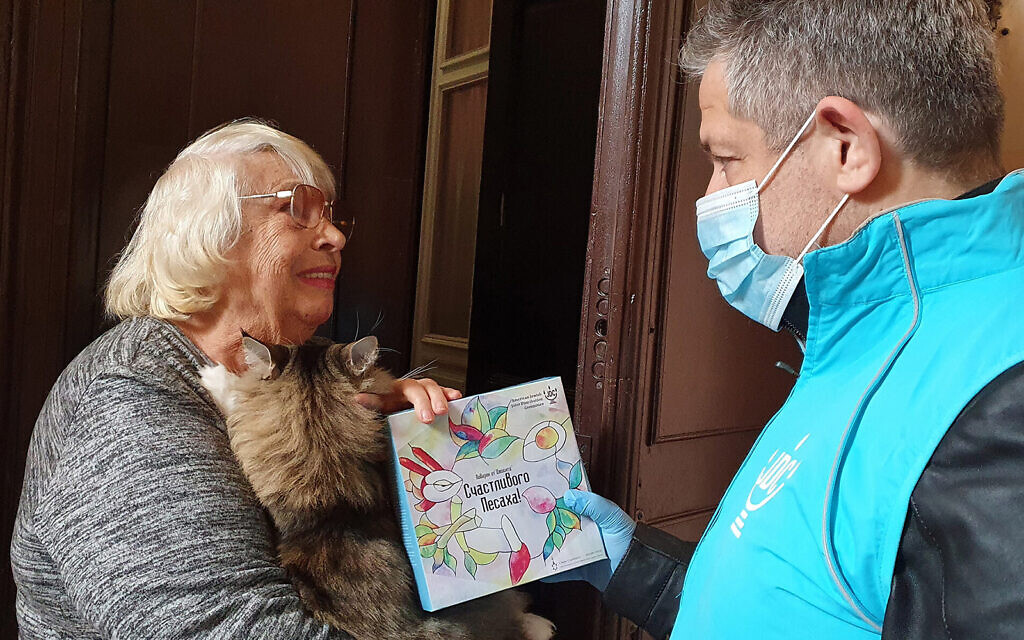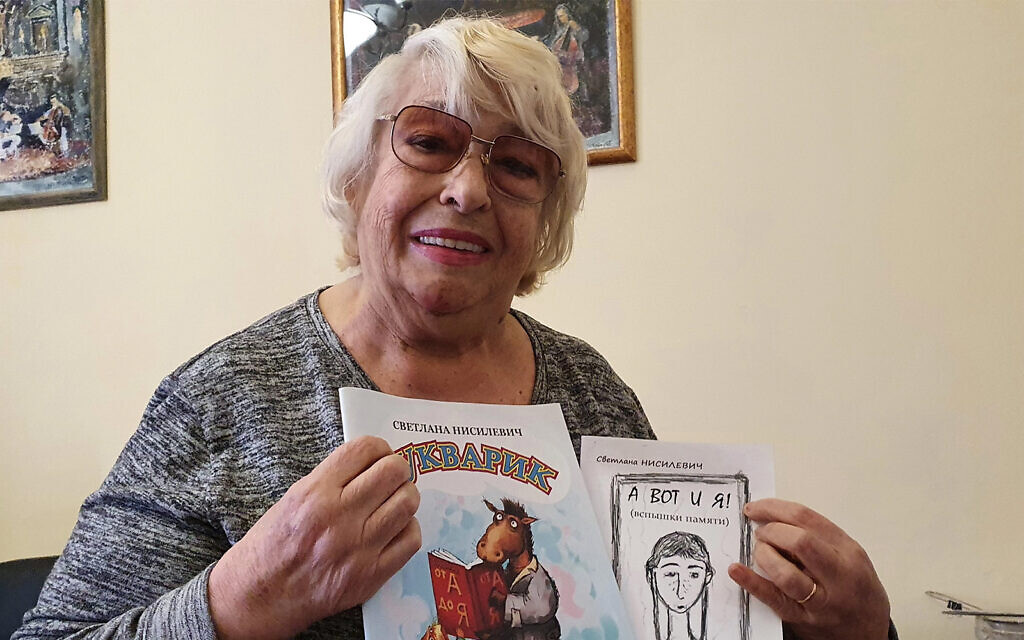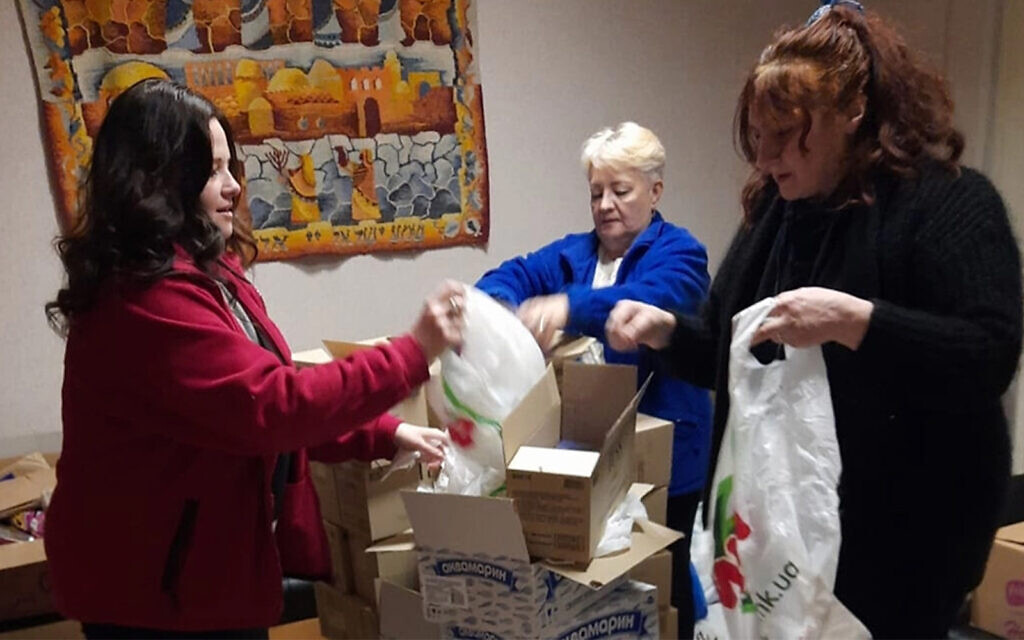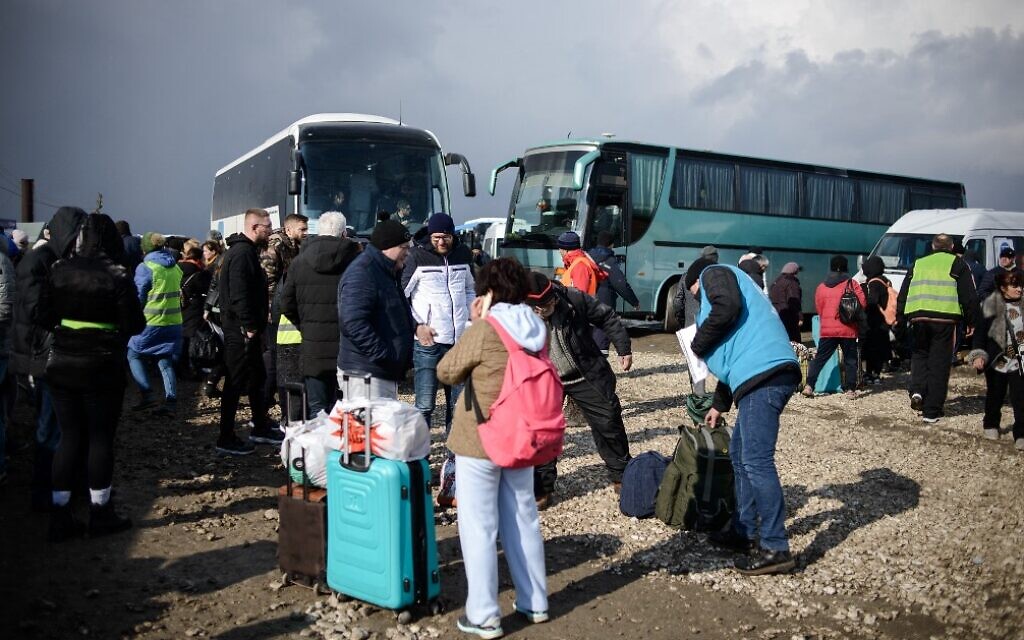The threat of violence, curfews and supply-chain disruptions are complicating the holiday efforts, but thousands still plan to partake in festivities

JTA — Between air raid sirens in Odesa, Svetlana Niselevitch, an 84-year-old Ukrainian Jewish Holocaust survivor, has been preparing to join a Passover seder for the first time in her life.
“We didn’t observe Jewish traditions in my family,” Niselevitch, a poet who was born in Kharkiv, told the Jewish Telegraphic Agency. But she said Russia’s invasion of Ukraine, as well as the COVID-19 pandemic, convinced her that “every chance to practice Jewishness is important.”
Niselevitch, who will celebrate Passover at an event organized by the American Jewish Joint Distribution Committee, or JDC, is among the thousands of Ukrainian Jews who are preparing to celebrate the Jewish holiday in dozens of group seders both in Ukraine and outside it for Jewish refugees from Russia’s war.
Emergency curfews, supply-chain interruptions and the dangers of war are complicating Ukrainian Jews’ efforts to celebrate Passover, the holiday that celebrates Jewish freedom and security.
Still, the fact that so many Jews are participating demonstrates both the robustness of the worldwide relief effort supporting Ukrainian Jews, and Judaism’s ongoing resilience in a region scarred by the Holocaust and communist suppression of religion.
Thousands of Ukrainians have died in the ensuing conflict and millions have left the country, mostly into neighboring European countries and, for Jews and their family members, to Israel. Millions more have become internally displaced, seeking refuge in places they hope are unlikely to draw Russian bombings.
For the Jews who remain inside Ukraine, wanting to participate in large gatherings in such circumstances may seem counterintuitive, especially considering that the pandemic is still raging across Eastern Europe. “But it’s only natural,” said Gershon Birenboim, a Jewish teacher who is helping to prepare a group seder for Jewish refugees from Odesa, Kharkiv, Kyiv and beyond who are staying at a resort in Irshava in western Ukraine.
“When you’ve fled a war, sometimes being separated from family, leaving behind everything, that’s when you’ll start looking for the things that connect you and tie you down,” he said.

Chabad and JDC have been organizing group seders across Eastern Europe for decades, including under challenging geopolitical circumstances. Other groups, such as the HIAS Jewish refugee agency, are departing from their normal activities to offer Passover events.
At least 20 cities in Ukraine will have group seders run by Chabad, similar to normal years, according to Motti Seligson, the Chabad-Lubavitch movement’s director of media relations.
Chabad alone has collected at least 20 tons of matzah in Ukraine despite border closures, customs delays and other supply chain failures connected to Russia’s invasion.
There are other complications. Part of the tradition of Passover is to discuss the story of the Jewish exodus from Egypt late into the night, but most of the country’s cities have emergency curfews in place.
Some seders, including one for 300 guests in Kyiv, are being held at hotels where the seder participants can sleep over.
For people unable or afraid to attend in-person seders, the JDC has set up a virtual online seder. The event will build on technology and techniques the organization has perfected during COVID to relieve loneliness among thousands of elderly aid recipients without exposing them to risk, funded by the UJA-Federation of New York, the Jewish Federations of North America and the Claims Conference. The New York federation said it had sent more than 20,000 prepackaged seder kits to Ukraine in advance of the holiday.
Niselevitch, the poet from Odesa, is opting for the online celebration, which is held before sunset so as not to violate the Jewish legal prohibitions around using electricity on Passover.
“We celebrate Jewish holidays at home the way we are able to and the way we know, probably, not the most perfect way,” she said.
Evgenia Malikova, a 67-year-old retired international aid professional from Kyiv who last month fled Ukraine to Belgium, has attended seders in the past — but only a couple of times.
“My father was Jewish, my mother was not. I’m not very deeply immersed in religion in Judaism, though I am attached to it,” she told JTA.

In Brussels she has decided to join the seder being organized by HIAS at the city’s European Jewish Community Centre. She feels she’s “very much behind” on celebrating Jewish traditions generally but part of what made Malikova, who has one daughter and two grandchildren in Berlin, want to attend a seder is “the symbolic similarity of the exodus [of the Israelites from Egypt], which reminds me of what’s happening now,” she added.
Many Ukrainian refugees outside their country are also seeking a seder and the company of their fellow Jews, according to Rabbi Zushe Abelsky, the director of Chabad in Moldova, where hundreds of thousands of Ukrainians have fled, including many members of the Jewish minority of Ukraine, which numbers at least 43,000 people.
Demand for seders in Chisinau, Moldova’s capital, is so high that Abelsky and his staff have had to open the Central Synagogue of Chisinau even though it is currently closed for renovations. The local community, which numbers about 1,900 people, according to a 2020 study, had planned to celebrate in a smaller, alternative venue this year.

Chabad of Moldova, which usually stocks up on matzah and other Passover supplies months in advance, has received them only this week.
“We were hunting for matzah, every piece we could get,” Abelsky said. Part of the problem was that Moldova’s Jewish community relies on Ukraine’s for such supplies. They had to be imported from Israel and Hungary this year, with help from the International Fellowship of Christians and Jews.
Many other groups sent supplies to Eastern Europe in advance of Passover. The Orthodox Union, for instance, said it had sent more than 200 tons of food and medical supplies, including 70,000 pounds of matzah, 50 tons of kosher meat and chicken and 14,500 gallons of grape juice.
In addition to Moldova, Poland, Hungary, Romania are among the East European countries where Jewish communities are organizing public seders for refugees, complete with Russian-language haggadahs containing the seder text.
In Poland, World Central Kitchen, the food aid group operated by Chef Jose Andres, will be serving 15,000 kosher-for-Passover meals a day to Jewish refugees there, according to the New York federation.
In Hungary, the government this week set aside, at the request of local Jewish leaders, one refugee housing facility to be made kosher for Passover. They chose the lush Őszöd lakeside resort, 70 miles outside of Budapest, where 200 Ukrainian Jews were already staying. (The resort is where a former prime minister in 2006 delivered a famous profanity-laden speech accusing his own Socialist party of corruption, widely seen as a factor in bringing Prime Minister Viktor Orban’s right-wing Fidesz party to power.)
The thousands of Jewish arrivals to Western Europe, and especially Germany and Austria, will also have seders especially designed for them, including at the Lauder Chabad Campus in Vienna.
And in Israel, where thousands of Ukrainians and Russians have moved because of the war, the Jewish Agency, Chabad and individual municipalities, such as Nof Hagalil, are also giving public seders for refugees, mostly at the hotels where they are being housed.
In Chisinau, Abelsky, a 55-year-old who has four children with his wife Chayah, is preparing to deliver a few words addressed to the hundreds of Ukrainians who have joined his community, at least temporarily — and its three public seders.
“The Israelites began fleeing Egypt under the cover of darkness, at night,” he told JTA. “But then the sun rose and a miracle happened,” he said, referring to the story of the parting of the Red Sea for the fleeing Israelites.
“The same will happen for our refugees: It’s the middle of the night for them now but soon the sun will rise and a path to safety will present itself,” he said. “They will rebuild a life better than the ones they left behind.”
As reported by The Times of Israel
